Charles E W Bean, Diaries, AWM38 3DRL 606/261/1 - 1929 - 1930 - Part 12
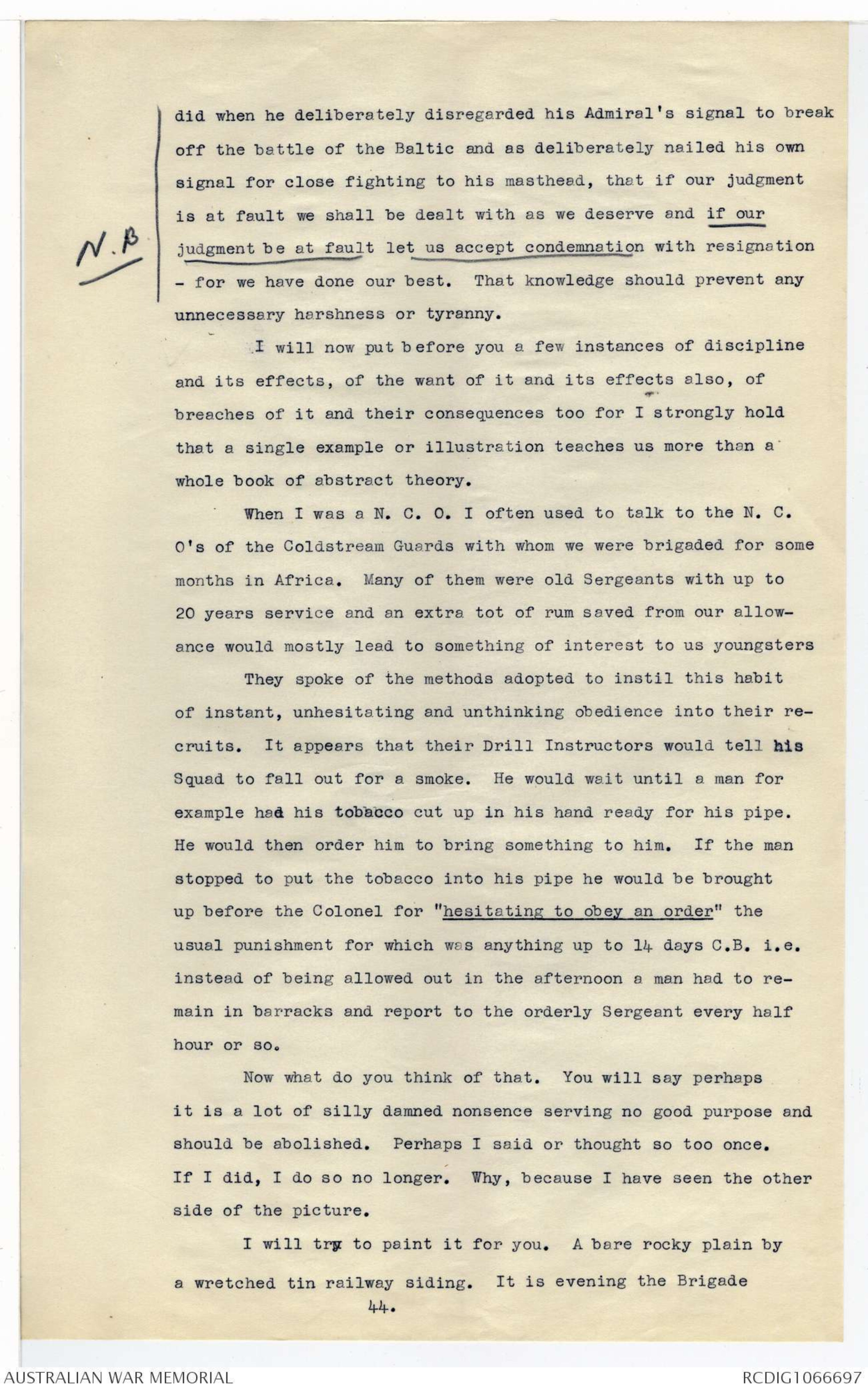
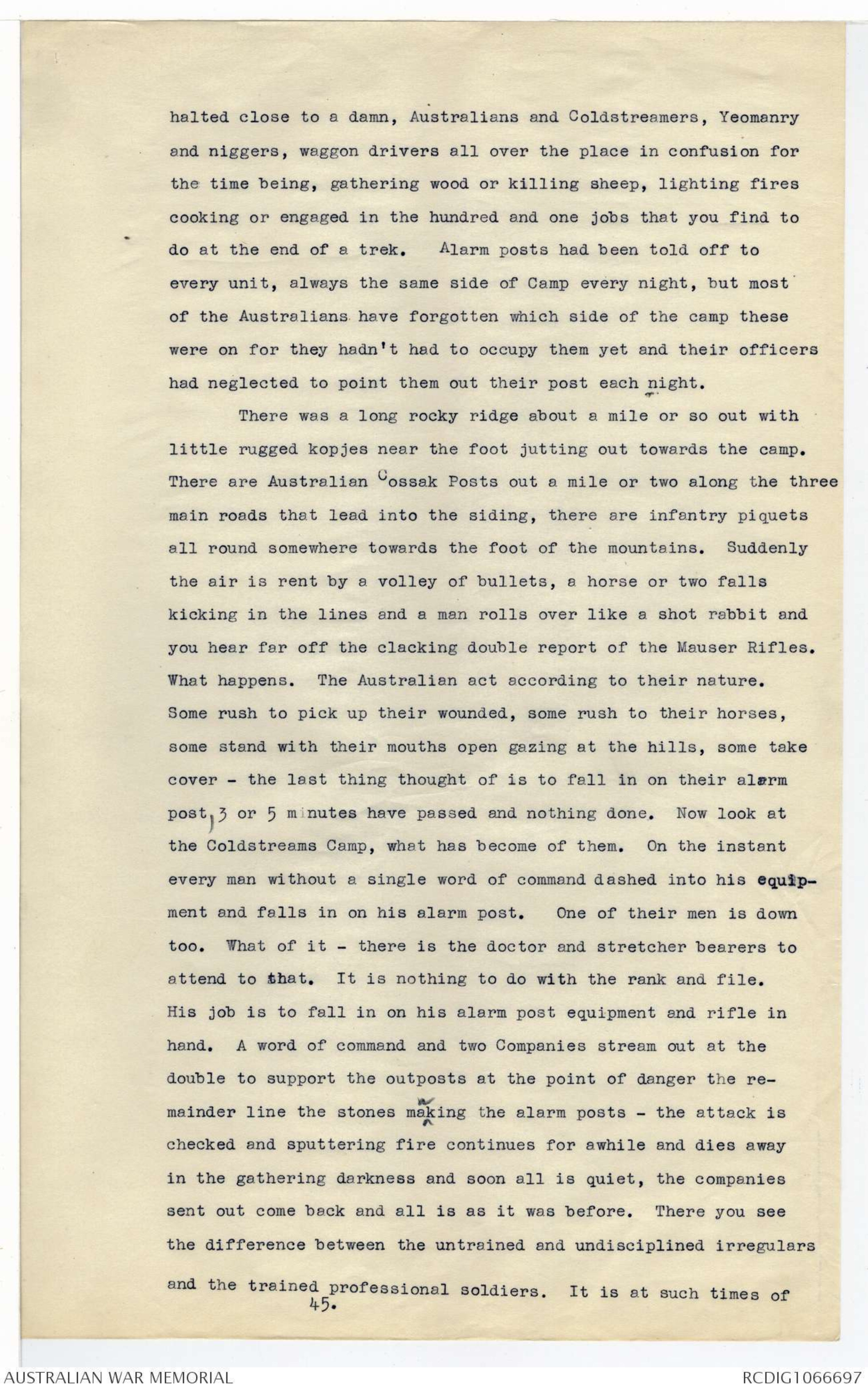
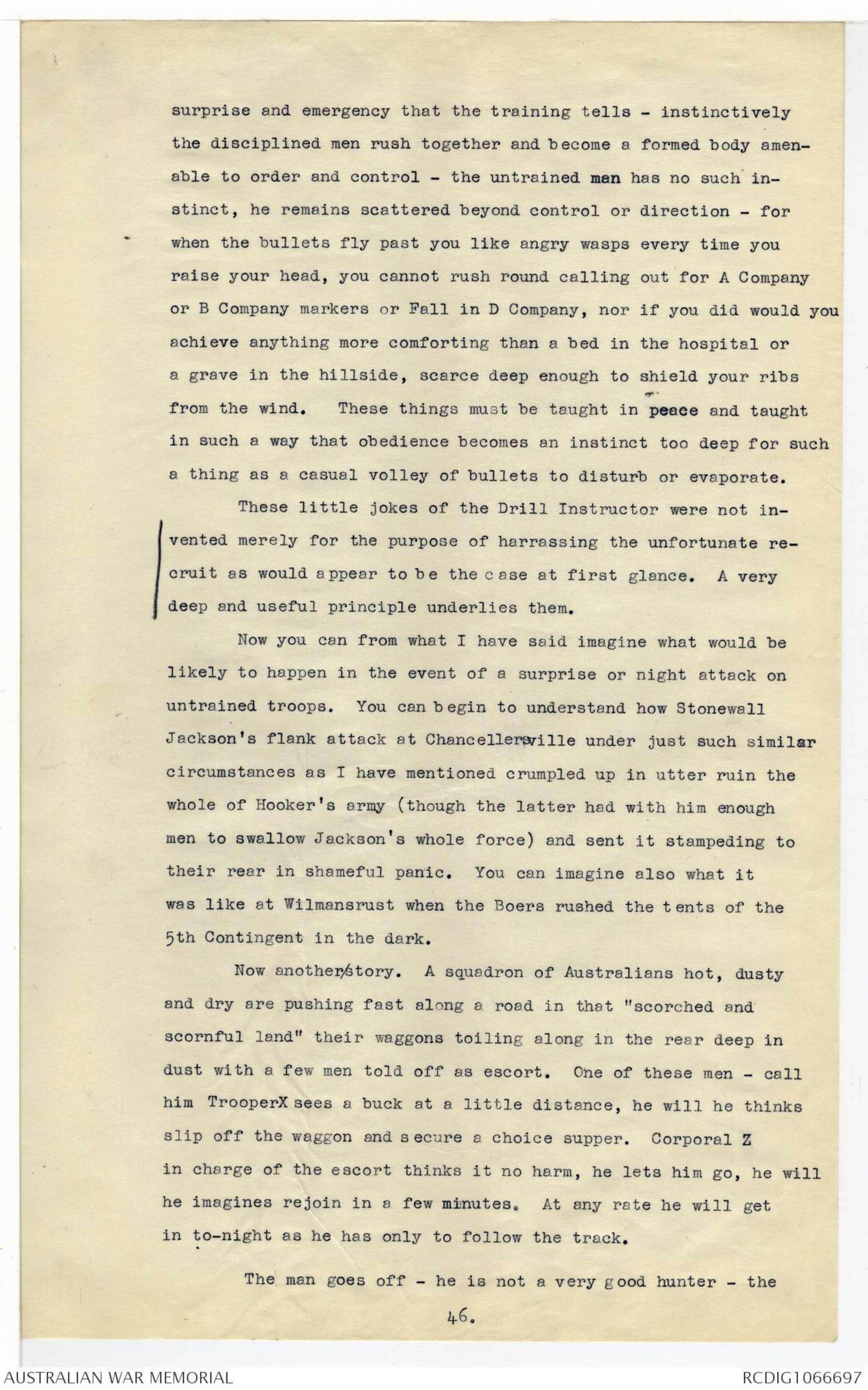
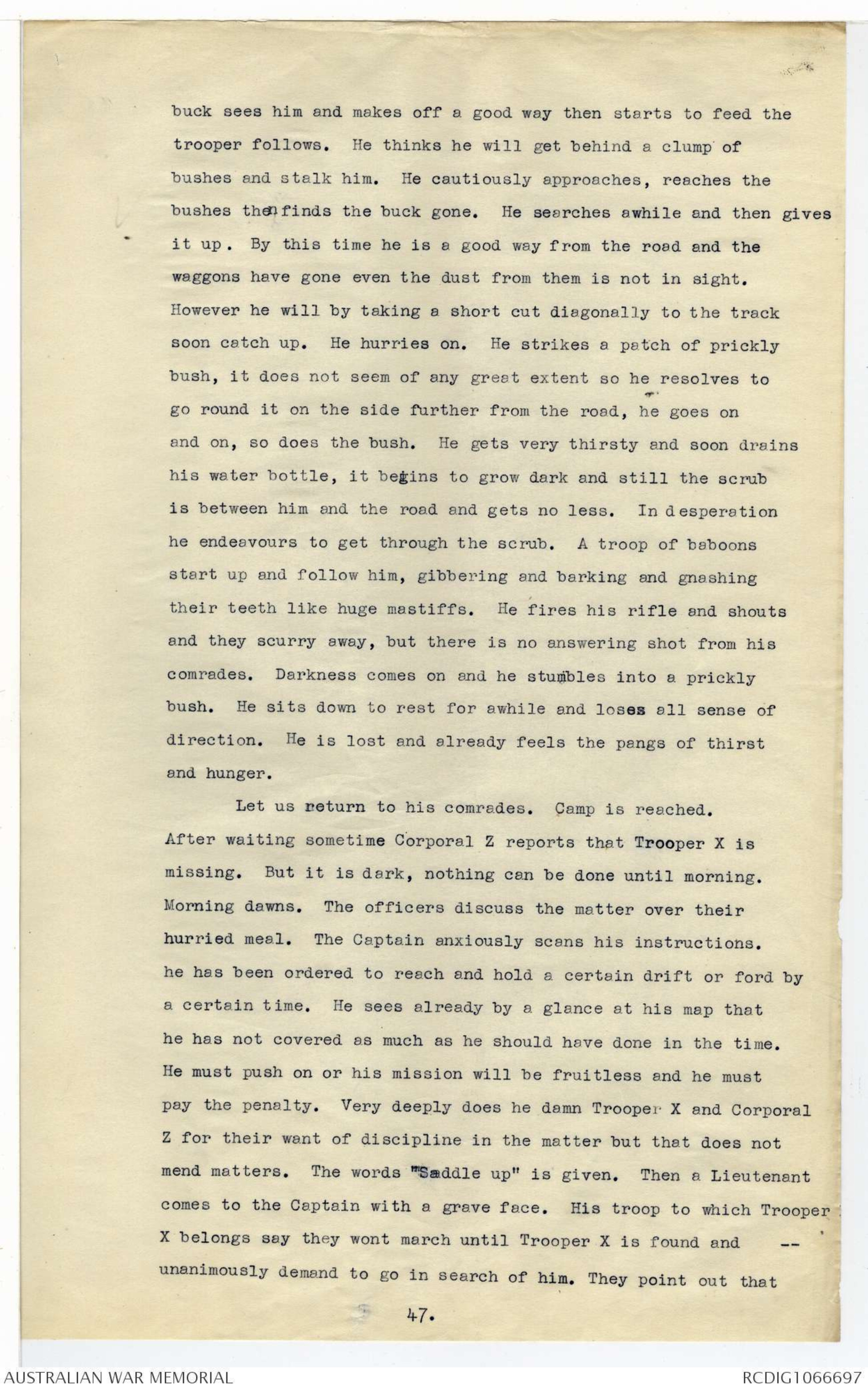
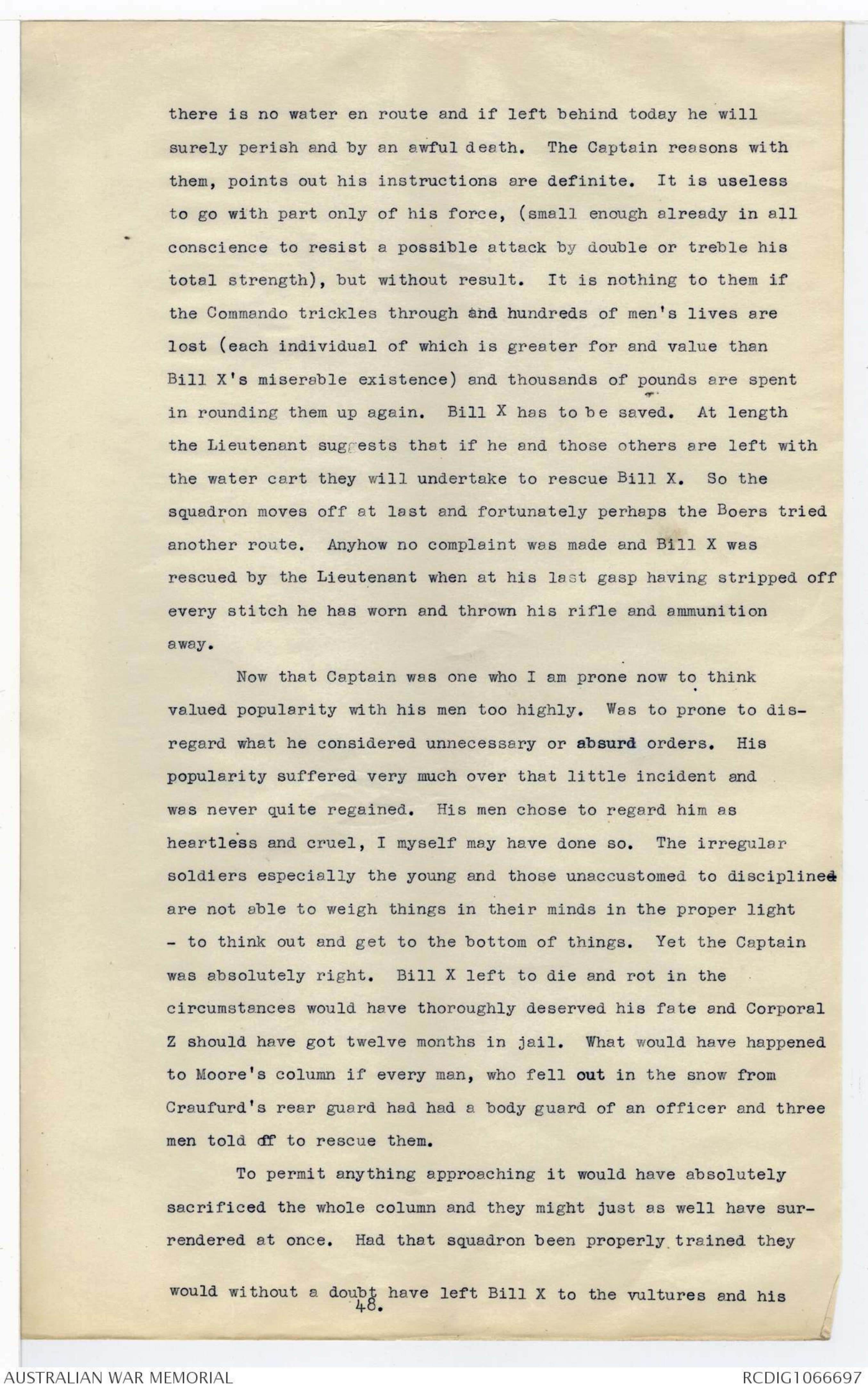
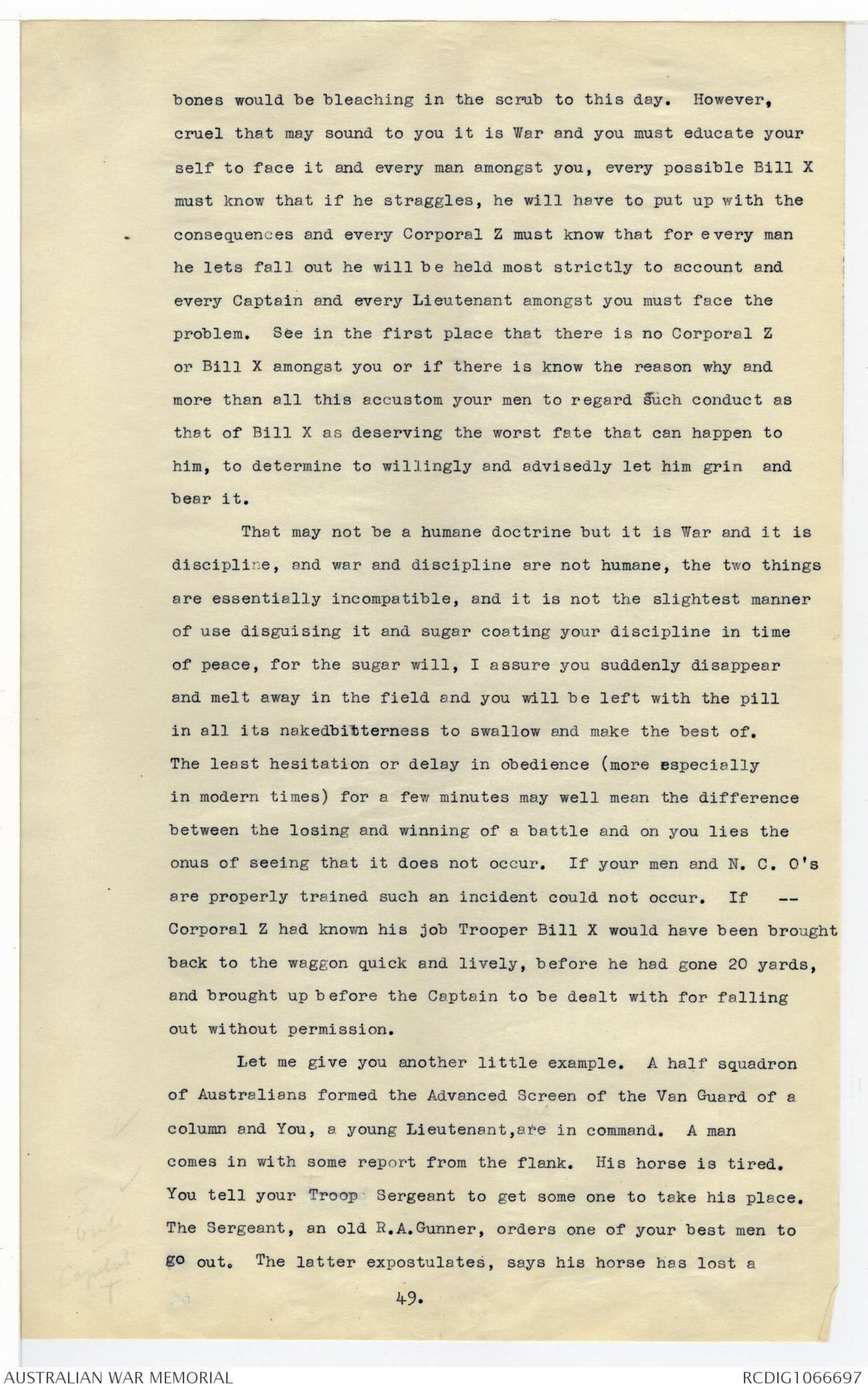
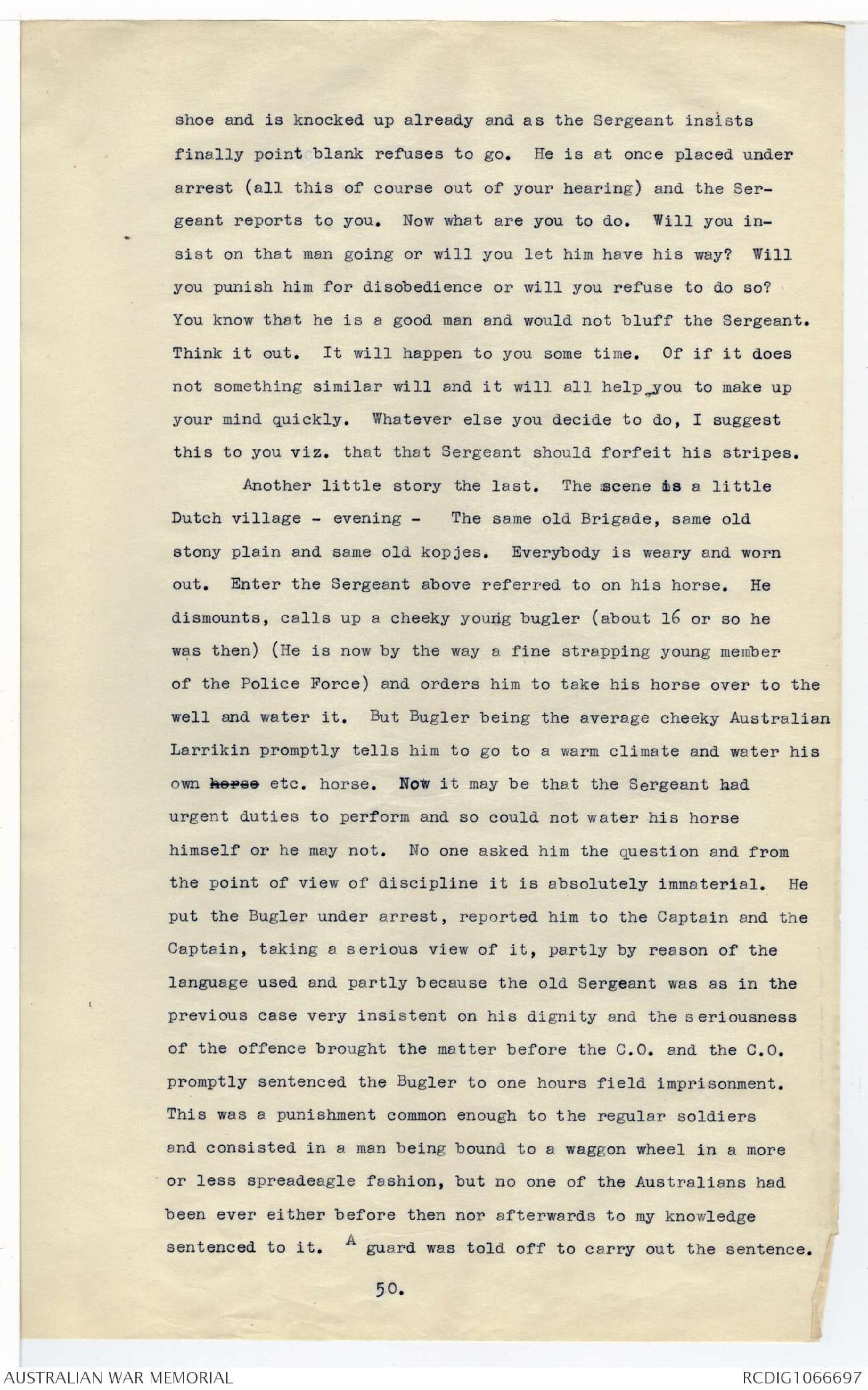
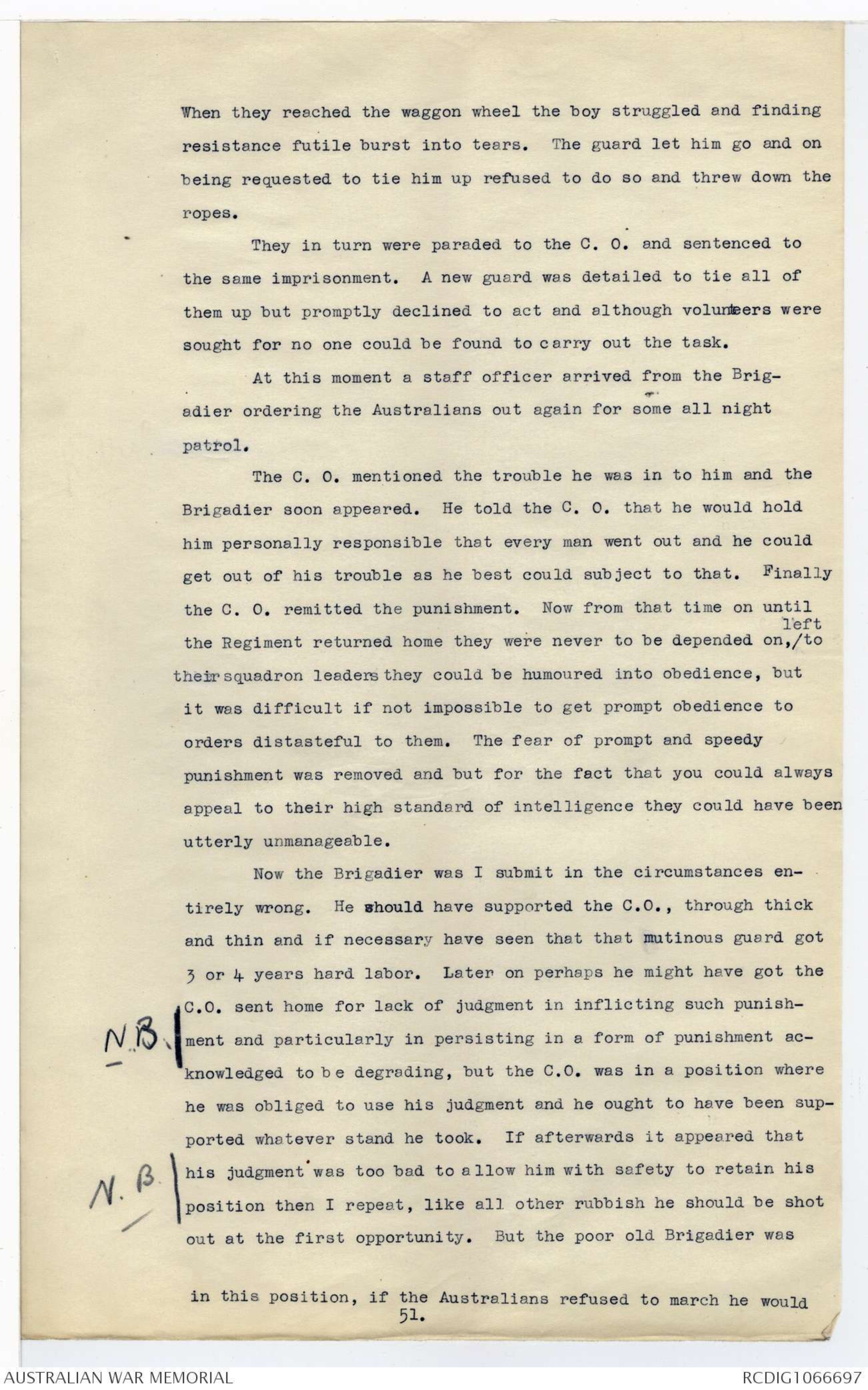
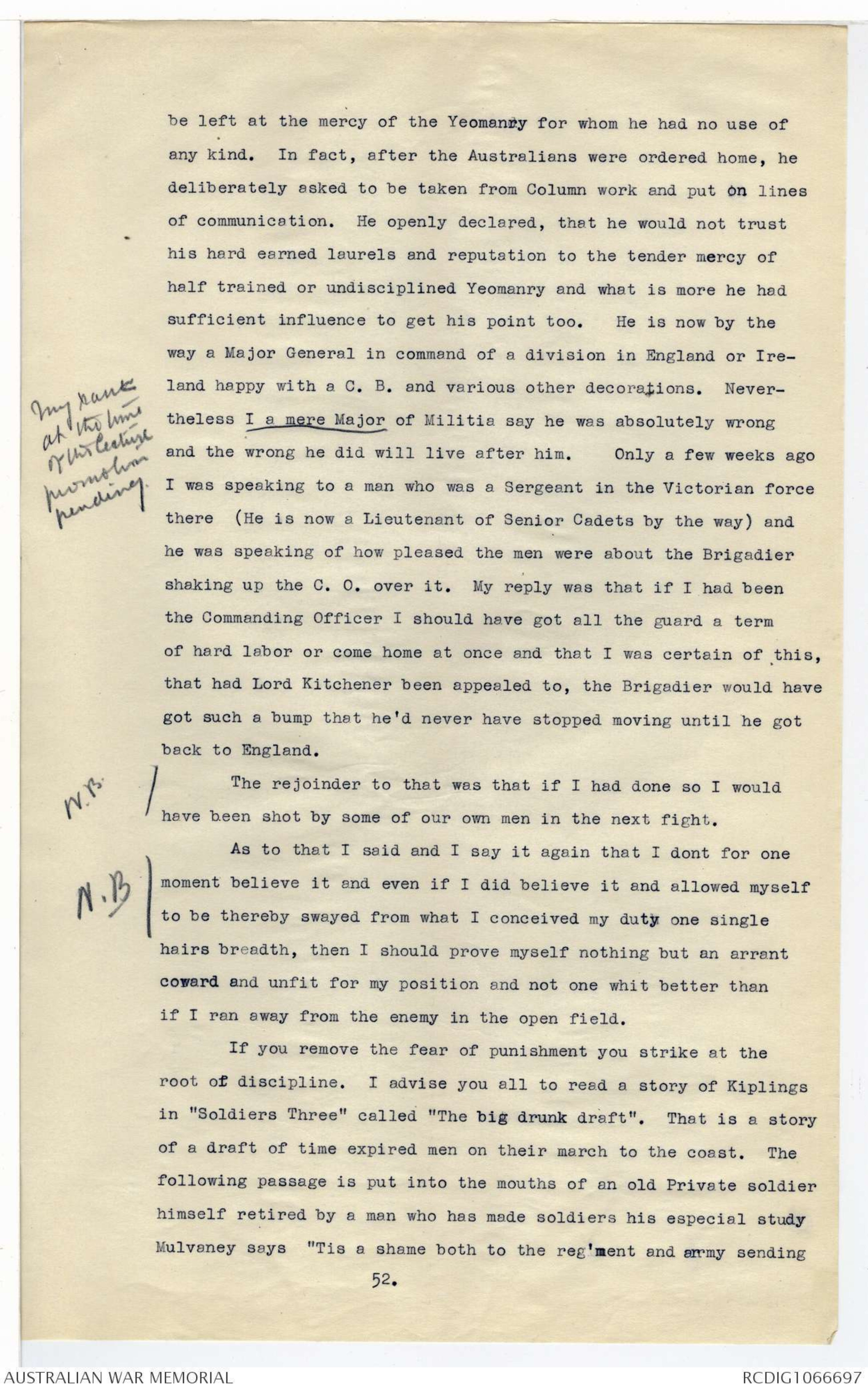
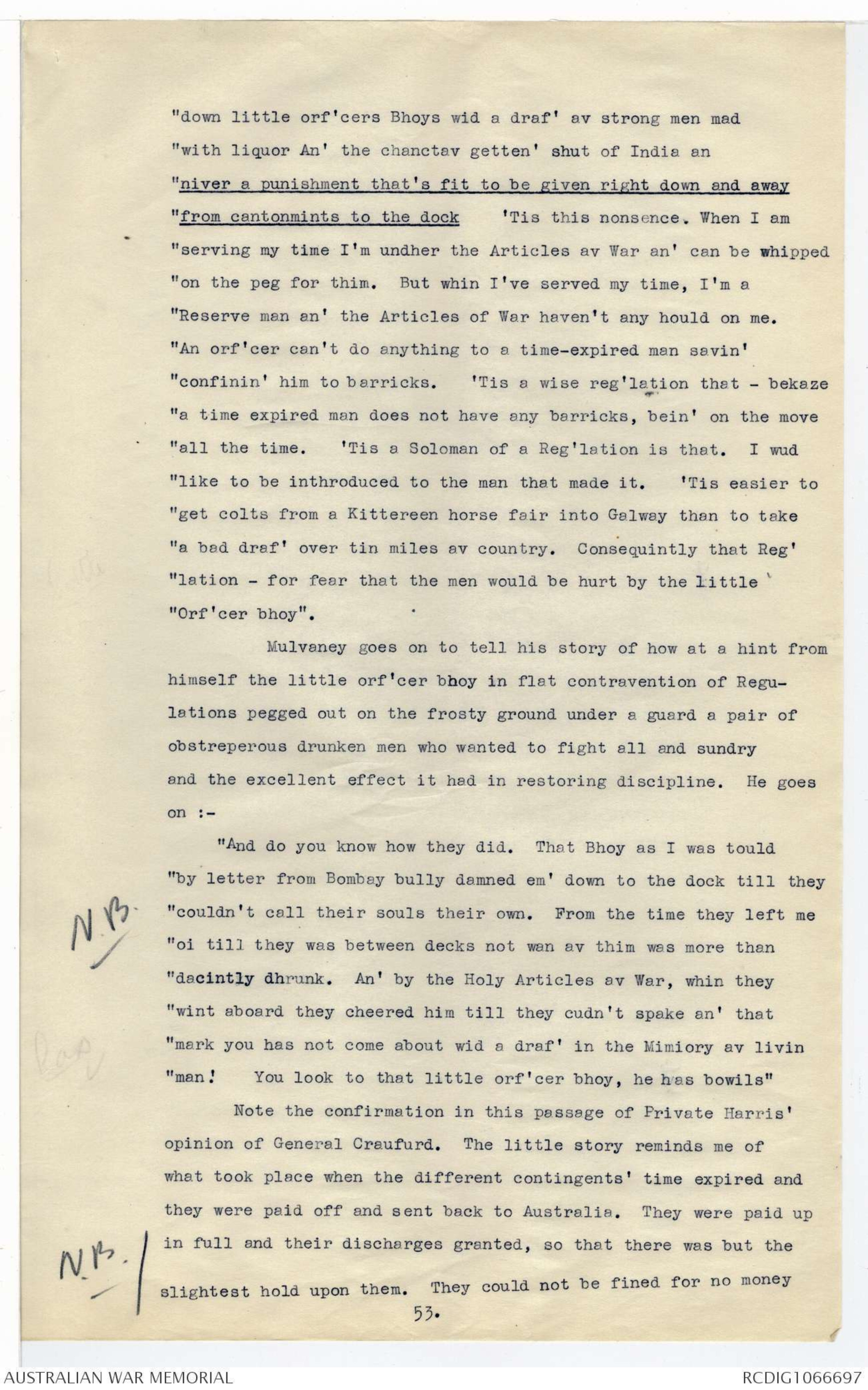
N.B
did when he deliberately disregarded his Admiral's signal to break
off the battle of the Baltic and as deliberately nailed his own
signal for close fighting to his masthead, that if our judgment
is at fault we shall be dealt with as we deserve and if our
judgment be at fault let us accept condemnation with resignation
-for we have done our best. That knowledge should prevent any
unnecessary harshness or tyranny.
I will now put before you a few instances of discipline
and its effects, of the want of it and its effects also, of
breaches of it and their consequences too for I strongly hold
that a single example or illustration teaches us more than a
whole book of abstract theory.
When I was a N.C.O. I often used to talk to the N.C.
O's of the Coldstream Guards with whom we were brigaded for some
months in Africa. Many of them were old Sergeants with up to
20 years service and an extra tot of rum saved from our allowance
would mostly lead to something of interest to us youngsters
They spoke of the methods adopted to instil this habit
of instant, unhesitating and unthinking obedience into their recruits.
It appears that their Drill Instructors would tell his
Squad to fall out for a smoke. He would wait until a man for
example had his tobacco cut up in his hand ready for his pipe.
He would then order him to bring something to him. If the man
stopped to put the tobacco into his pipe he would be brought
up before the Colonel for "hesitating to obey an order" the
usual punishment for which was anything up to 14 days C.B. i.e.
instead of being allowed out in the afternoon a man had to remain
in barracks and report to the orderly Sergeant every half
hour or so.
Now what do you think of that. You will say perhaps
it is a lot of silly damned nonsence serving no good purpose and
should be abolished. Perhaps I said or thought so too once.
If I did, I do so no longer. Why, because I have seen the other
side of the picture.
I will try to paint it for you. A bare rocky plain by
a wretched tin railway siding. It is evening the Brigade
44.
halted close to a damn, Australians and Coldstreamers, Yeomanry
and niggers, waggon drivers all over the place in confusion for
the time being, gathering wood or killing sheep, lighting fires
cooking or engaged in the hundred and one jobs that you find to
do at the end of a trek. Alarm posts had been told off to
every unit, always the same side of Camp every night, but most
of the Australians have forgotten which side of the camp these
were on for they hadn't had to occupy them yet and their officers
had neglected to point them out their post each night.
There was a long rocky ridge about a mile or so out with
little rugged kopjes near the foot jutting out towards the camp.
There are Australian Cossak Posts out a mile or two along the three
main roads that lead into the siding, there are infantry piquets
all round somewhere towards the foot of the mountains. Suddenly
the air is rent by a volley of bullets, a horse or two falls
kicking in the lines and a man rolls over like a shot rabbit and
you hear far off the clacking double report of the Mauser Rifles.
What happens. The Australian act according to their nature.
Some rush to pick up their wounded, some rush to their horses,
some stand with their mouths open gazing at the hills, some take
cover - the last thing thought of is to fall in on their alarm
post, 3 or 5 minutes have passed and nothing done. Now look at
the Coldstreams Camp, what has become of them. On the instant
every man without a single word of command dashed into his equip-
ment and falls in on his alarm post. One of their men is down
too. What of it - there is the doctor and stretcher bearers to
attend to that. It is nothing to do with the rank and file.
His job is to fall in on his alarm post equipment and rifle in
hand. A word of command and two Companies stream out at the
double to support the outposts at the point of danger the remainder
line the stones ma^rking the alarm posts - the attack is
checked and sputtering fire continues for awhile and dies away
in the gathering darkness and soon all is quiet, the companies
sent out come back and all is as it was before. There you see
the difference between the untrained and undisciplined irregulars
and the trained professional soldiers. It is at such times of
45.
surprise and emergency that the training tells - instinctively
the disciplined men rush together and become a formed body amen-
able to order and control - the untrained man has no such instinct,
he remains scattered beyond control or direction - for
when the bullets fly past you like angry wasps every time you
raise your head, you cannot rush round calling out for A Company
or B Company markers or Fall in D Company, nor if you did would you
achieve anything more comforting than a bed in the hospital or
a grave in the hillside, scarce deep enough to shield your ribs
from the wind. These things must be taught in peace and taught
in such a way that obedience becomes an instinct too deep for such
a thing as a casual volley of bullets to disturb or evaporate.
These little jokes of the Drill Instructor were not invented
merely for the purpose of harrassing the unfortunated recruit
as would apear to be the case at first glance. A very
deep and useful principle underlies them.
Now you can from what I have said imagine what would be
likely to happen in the event of a surprise or night attack on
untrained troops. You can begin to understan how Stonewall
Jackson's flank attack at Chancellersville under just such similar
circumstances as I have mentioned crumpled up in utter ruin the
whole of Hooker's army (though the latter had with him enough
men to swallow Jackson's whole force) and sent it stampeding to
their rear in shameful panic. You can imagine also what it
was like at Wilmansrust when the Boers rushed the tents of the
5th Contingent in the dark.
Now another/story. A squadron of Australians hot, dusty
and dry are pushing fast along a road in that "scorched and
scornful land" their waggons toiling along in the rear deep in
dust with a few men told off as escort. One of these men - call
him TrooperX sees a buck at a little distance, he will he thinks
slip off the waggon and secure a choice supper. Corporal Z
in charge of the escort thinks it no harm, he lets him go, he will
he imagines rejoin in a few minutes. At any rate he will get
in to-night as he has only to follow the track.
The man goes off - he is not a very good hunter - the
46.
buck sees him and makes off a good way then starts to feed the
trooper follows. He thinks he will get behind a clump of
bushes and stalk him. He cautiously approaches, reaches the
bushes then finds the buck gone. He searches awhile and then gives
it up. By this time he is a good way from the road and the
waggons have gone even the dust from them is not in sight.
However he will by taking a short cut diagonally to the track
soon catch up. He hurries on. He strikes a patch of prickly
bush, it does not seem of any great extent so he resolves to
go round it on the side further from the road, he goes on
and on, so does the bush. He gets very thirsty and soon drains
his water bottle, it begins to grow dark and still the scrub
is between him and the road and gets no less. In desperation
he endeavours to get through the scrub. A troop of baboons
start up and follow him, gibbering and barking and gnashing
their teeth like huge mastiffs. He fires his rifle and shouts
and they scurry away, but there is no answering shot from his
comrades. Darkness comes on and he stumbles into a prickly
bush. He sits down to rest for awhile and loses all sense of
direction. He is lost and already feels the pangs of thirst
and hunger.
Let us return to his comrades. Camp is reached.
After waiting sometime Corporal Z reports that Trooper X is
missing. But it is dark, nothing can be done until morning.
Morning dawns. The officers discuss the matter over their
hurried meal. The Captain anxiously scans his instructions.
he has been ordered to reach and hold a certain drift or ford by
a certain time. He sees already by a glance at his map that
he has not covered as much as he should have done in the time.
He must push on or his mission will be fruitless and he must
pay the penalty. Very deeply does he damn Trooper X and Corporal
Z for their want of discipline in the matter but that does not
mend matters. The words "Saddle up" is given. Then a Lieutenant
comes to the Captain with a grave face. His troop to which Trooper
X belongs say they wont march until Trooper X is found and --
unanimously demand to go in search of him. They point out that
47.
there is no water en route and if left behind today he will
surely perish and by an awful death. The Captain reasons with
them, points out his instructions are definite. It is useless
to go with part only of his force, (small enough already in all
conscience to resist a possible attack by double or treble his
total strength), but without result. It is nothing to them if
the Commando trickles through and hundreds of men's lives are
lost (each individual of which is greater for and value than
Bill X's miserable existence) and thousands of pounds are spent
in rounding them up again. Bill X has to be saved. At length
the Lieutenant suggests that if he and those others are left with
the water cart they will undertake to rescue Bill X. So the
squadron moves off at last and fortunately perhaps the Boers tried
another route. Anyhow no complaint was made and Bill X was
rescued by the Lieutenant when at his last gasp having stripped off
every stitch he has worn and thrown his rifle and ammunition
away.
Now that Captain was one who I am prone now to think
valued popularity with his men too hightly. Was prone to disregard
what he considered unnecessary or absurd orders. His
popularity suffered very much over that little incident and
was never quite regained. His men chose to regard him as
heartless and cruel. I myself may have done so. The irregular
soldiers especially the young and those unaccustomed to discipline
are not able to weigh things in their minds in the proper light
-to think out and get to the bottom of things. Yet the Captain
was absolutely right. Bill X left to die and rot in the
circumstances would have thoroughly deserved his fate and Corporal
Z should have got twelve months in jail. What would have happened
to Moore's column if every man, who fell out in the snow from
Craufurd's rear guard had had a body guard of an officer and three
men told off to rescue them.
To permit anything approaching it would have absolutely
sacrificed the shole column and they might just as well have sur-
rendered at once. Had that squadron been properly trained they
would without a doubt have left Bill X to the vultures and his
48.
bones would be bleaching in the scrub to this day. However,
cruel that may sound to you it is War and you must educate your
self to face it and every man amongst you, every possible Bill X
must know that if he straggles, he will have to put up with the
consequences and every Corporal Z must know that for every man
he lets fall out he will be held most strictly to account and
every Captain and every Lieutenant amongst you must face the
problem. See in the first place that there is no Corporal Z
or Bill X amongst you or if there is know the reason why and
more than all this accustom your men to regard such conduct as
that of Bill X as deserving the worst fate that can happen to
him, to determine to willingly and advisedly let him grin and
bear it.
That may not be a humane doctrine but it is War and it is
discipline, and war and discipline are not humane, the two things
are essentially incompatible, and it is not the slightest manner
of use disguising it and sugar coating your discipline in time
of peace, for the sugar will, I assure you suddenly disappear
and melt away in the field and you will be left with the pill
in all its naked bitterness to swallow and make the best of.
The least hesitation or delay in obedience (more especially
in modern times) for a few minutes may well mean the difference
between the losing and winning of a battle and on you lies the
onus of seeing that it does not occur. If your men and N.C.O's
are properly trained such an incident could not occur. If --
Corporal Z had known his job Trooper Bill X would have been brought
back to the waggon quick and lively, before he had gone 20 yards,
and brought up before the Captain to be dealt with for falling
out without permission.
Let me give you another little example. A half squadron
of Australians formed the Advanced Screen of the Van Guard of a
column and You, a young Lieutenant, are in command. A man
comes in with some report from the flank. His horse is tired.
You tell your Troop Sergeant to get some one to take his place.
The Sergeant, an old R.A.Gunner, orders one of your best men to
go out. The latter expostulates, says his horse has lost a
49.
shoe and is knocked up already and as the Sergeant insists
finally point blank refuses to go. He is at once placed under
arrest (all this of course out of your hearing) and the Sergeant
reports to you. Now what are you to do. Will you insist
on that man going or will you let him have his way? Will
you punish him for disobedience or will you refuse to do so?
You know that he is a good man and would not bluff the Sergeant.
Think it out. It will haen to you some time. Or if it does
not something similar will and it will all help you to make up
your mind quickly. Whatever else you decide to do, I suggest
this to you viz. that that Sergeant should forfeit his stripes.
Another little story the last. The scene is a little
Dutch village - evening - The same old Brigade, same old
stony plain and same old kopjes. Everybody is weary and worn
out. Enter the Sergeant above referred to on his horse. He
dismounts, calls up a cheeky young bugler (about 16 or so he
was then) (He is now by the way a fine strapping young member
of the Police Force) and orders him to take his horse over to the
well and water it. But Bugler being the average cheeky Australian
Larrikin promptly tells him to go to a warm climate and water his
own horse etc. horse. Now it may be that the Sergeant had
urgent duties to perform and so could not water his horse
himself or he may not. No one asked him the question and from
the point of view of discipline it is absolutely immaterial. He
put the Bugler under arrest, reported him to the Captain and the
Captain, taking a serious view of it, partly by reason of the
language used and partly because the old Sergeant was as in the
previous case very insistent on his dignity and the seriousness
of the offence brough the matter before the C.O. and the C.O.
promptly sentenced the Bugler to one hours field imprisonment.
This was a punishment common enough to the regular soldiers
and consisted in a man being bound to a waggon wheel in a more
or less spreadeagle fashion, but no one of the Australians had
been ever either before then nor afterwards to my knowledge
sentenced to it. A guard was told off to carry out the sentence.
50.
When they reached the waggon wheel they boy struggled and finding
resistance futile burst into tears. The guard let him go and on
being requested to tie him up refused to do so and threw down the
ropes.
They in turn were paraded to the C.O. and sentenced to
the same imprisonment. A new guard was detailed to tie all of
them up but promptly declined to act and although volunteers were
sought for no one could be found to carry out the task.
At this moment a staff officer arrived from the Brigadier
ordering the Australians out again for some all night
patrol.
The C.O. mentioned the trouble he was in to him and the
Brigadier soon appeared. He told the C.O. that he would hold
him personally responsible that every man went out and he could
get out of his trouble as he best could subject to that. Finally
the C.O. remitted the punishment. Now from that time on until
the Regiment returned home they were never to be depended on,left/to their squadron leaders they could be humoured into obedience, but it was difficult if not impossible to get prompt obedience to orders distasteful to them. The fear of prompt and speedy
punishment was removed and but for the fact that you could always
appeal to their high standard of intelligence they could have been
utterly unmanageable.
Now the Brigadier was I submit in the circumstances entirely
wrong. He should have supported the C.O., through thick
and thin and if necessary have seen that that mutinous guard got
3 or 4 years hard labor. Later on perhaps he might have got the
C.O. sent home for lack of judgment in inflicting such punishment
N.B. and particularly in persisting in a form of punishment acknowledged to be degrading, but the C.O. was in a position where
he was obliged to use his judgment and he ought to have been supported whatever stand he took. If afterwards it appeared that
N.B. his judgment was too bad to allow him with safety to retain his
position then I repeat, like all other rubbish he should be shot
out at the first opportunity. But the poor old Brigadier was
in this position, if the Australians refused to march he would
51.
he left at the mercy of the Yeomanry for whom he had no use of
any kind. In fact, after the Australians were ordered home, he
deliberately asked to be taken from Column work and put on lines
of communication. He openly declared, that he would not trust
his hard earned laurels and reputation to the tender mercy of
half trained or undisciplined Yeomanry and what is more he had
sufficient influence to get his point too. He is now by the
way a Major General in command of a division in England or Ireland
happy with a C.B. and various other decorations. Nevertheless
I am mere Major of Militia say he was absolutely wrong
[my ran at the time of this ? promotion pending]
and the wrong he did will live after him. Only a few weeks ago
I was speaking to a man who was a Sergeant in the Victorian force
there (He is now a Lieutenant of Senior Cadets by the way) and
he was speaking of how pleased the men were about the Brigadier
shaking up the C.O. over it. My reply was that if I had been
the Commanding Officer I should have got all the guard a term
of hard labor or come home at once and that I was certain of this,
that had Lord Kitchener been appealed to, the Brigadier would have
got such a bump that he'd never have stopped moving until he got
back to England.
N.B. The rejoinder to that was that if I had done so I would
have been shot by some of our own men in the next fight.
N.B. As to that I said and I say it again that I dont for one
moment believe it and even if I did believe it and allowed myself
to be thereby swayed from what I conceived my duty one single
hairs breadth, then I should prove myself nothing but an arrant
coward and unfit for my position and not one whit better than
if I ran away from the enemy in the open field.
If you remove the fear of punishment you strike at the
root of discipline. I advise you all to read a story of Kiplings
in "Soldiers Three" called "The big runk draft". That is a story
of a draft of time expired men on their march to the coast. The
following passage is put into the mouths of an old Private soldier
himself retired by a man who has made soldiers his especial study
Mulvaney says "Tis a shame both to the regiment and army sending
52.
"down little orf'cers Bhoys wid a draf' av strong men mad
"with liquor An' the chanctav getten' shut of India an
"niver a punishment that's fit to be given right down and away
"from cantonmints to the dock 'Tis this nonsence. When I am
"serving my time I'm undher the Articles av War an' can be whipped
"on the peg for thim. But whin I've served my time, I'm a
"Reserve man an' the Articles of War haven't any hould on me.
"An orf'cer can't do anything to a time-expired man savin'
"confinin' him to barricks. 'Tis a wise reg'lation that - bekaze
"a time expired man does not have any barricks, bein' on the move
"all the time. 'Tis a Soloman of a Reg'lation is that. I wud
"like to be inthroduced to the man that made it. 'Tis easier to
"get colts from a Kittereen horse fair into Galway than to take
"a bad draf' over tin miles av country. Consequintly that Reg'
"lation - for fear that the men would be hurt by the little
"Orf'cer bhoy".
Mulvaney goes on to tell his story of how at a hint from
himself the little orf'cer bhoy in flat contravention of Regulations
pegged out on the frosty ground under a guard a pair of
obstreperous drunken men who wanted to fight all and sundry
and the excellent effect it had in restoring discipline. He goes
on:-
"And do you know how they did. That Bhoy as I was tould
"by letter from Bombay bully damned em' down to the dock till they
N.B. "couldn't call their souls their own. From the time they left me
"oi till they was between decks not wan av thim was more than
"decintly dhrunk. An' by the Holy Articles av War, whin they
"wint aboard they cheered him till they ducn't spake an' that
"mark you has not come about wid a draf' in the Mimiory av livin
"man! You look to that little orf'cer bhoy, he has bowils"
Note the confirmation in this passage of Private Harris'
opinion of General Craufurd. The little story reminds me of
what took place when the different contingents' time expired and
they were paid off and sent back to Australia. They were paid up
N.B. in full and their discharges granted, so that there was but the
slightest hold upon them. They could not be fined for no money
53.
 Sam scott
Sam scottThis transcription item is now locked to you for editing. To release the lock either Save your changes or Cancel.
This lock will be automatically released after 60 minutes of inactivity.